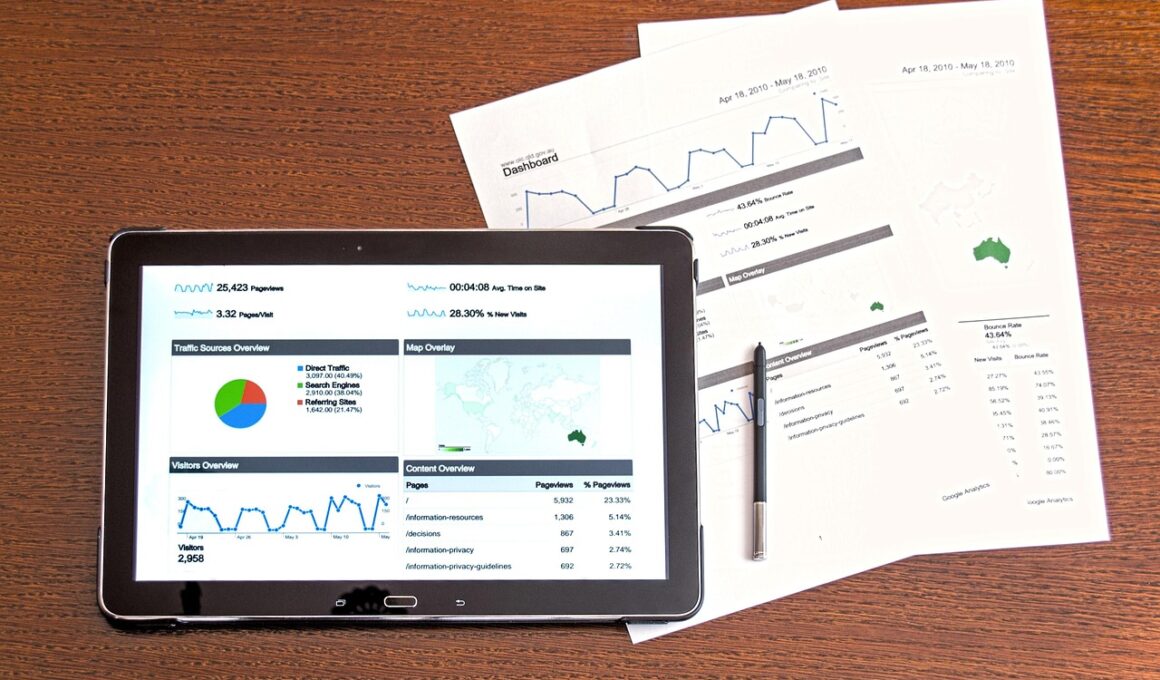Harnessing Data Analytics for Strategic Business Decisions
Data analytics is crucial to modern business management. It allows companies to leverage large amounts of data in order to make informed decisions. In today’s competitive environment, organizations must adapt quickly and use analytics to stay ahead. Through the collection of relevant data, businesses can enhance their performance metrics, reduce costs, and improve efficiency. This shift towards a data-driven approach empowers decision-makers to utilize insights derived from historical trends and predictive models effectively. Moreover, data analytics fosters collaboration across departments by encouraging teams to share and access data collaboratively. This democratization of data can lead to innovative solutions and creative problem-solving, which can significantly transform operational performance. Establishing a data-driven culture starts with ensuring that all employees understand the importance of data, cultivate analytical skills, and utilize the available tools efficiently. By aligning business strategies with data insights, companies can achieve their strategic goals and sustain a competitive edge. Overall, embracing data analytics is no longer an option; it has become a necessity for organizations aiming for long-term success and strategic growth in their respective industries.
One of the fundamental aspects of data-driven decision-making is understanding key performance indicators (KPIs). KPIs help assess an organization’s success in reaching its objectives. Clearly defined KPIs guide businesses in tracking their progress towards goals, enabling focused strategic decision-making. By utilizing data analytics tools, organizations can set specific, measurable, achievable, relevant, and time-bound (SMART) KPIs tailored to their unique needs. These KPIs can cover various dimensions, including financial performance, customer satisfaction, and operational efficiency. Furthermore, with advanced analytics techniques, companies can delve deeper into their data, identifying patterns that illuminate the underlying factors affecting performance. For instance, data visualization tools can present complex datasets in a more digestible format, allowing stakeholders to grasp trends and make relevant decisions. As organizations become more proficient in leveraging data analytics for monitoring KPIs, they will be better positioned to respond to shifting market dynamics effectively. Additionally, continuous assessment of published KPIs facilitates timely adjustments to strategies, thus ensuring that organizations remain agile and proactive in engaging with their markets. Overall, recognizing the importance of KPIs is vital for any establishment focused on data-driven strategies and outcomes.
Transforming Raw Data into Valuable Insights
Transforming raw data into valuable insights is a pivotal aspect of utilizing data analytics effectively. Raw data alone is insufficient; it needs to be processed, analyzed, and interpreted to inform business decisions. The data analysis process involves various tasks, including data cleaning, normalization, and aggregation, which are essential for deriving meaningful conclusions. Utilizing tools like data mining and machine learning algorithms enables organizations to extract patterns and insights from vast datasets. Moreover, employing advanced visualization tools can help in presenting complex data trends clearly and understandably. When done correctly, this transformation highlights important correlations that can guide tactical initiatives and strategic planning. Businesses often face challenges in maintaining data quality, which can impede their ability to derive actionable insights. Therefore, implementing processes aimed at fostering data accuracy and consistency is paramount. Additionally, organizations must invest in training their staff on how to interpret and apply data-driven insights effectively. This empowerment allows teams to create data-centric solutions and foster a growth-oriented culture. Ultimately, effectively transforming raw data into insights enhances operational efficiency and supports informed decision-making, ensuring that businesses remain competitive and progressive.
Predictive analytics is an indispensable tool that businesses leverage to anticipate future trends. By utilizing statistical algorithms and machine learning techniques, organizations can analyze current and historical data to make predictions about future outcomes. This forward-looking approach allows decision-makers to craft strategies that align with anticipated market behaviors. Predictive analytics can assist businesses in resource allocation, marketing strategy, and supply chain management by identifying patterns that inform future demands and needs. For example, retail businesses can predict customer purchasing behavior, enhancing inventory management and improving sales strategies. An essential element of predictive analytics is ensuring the quality of the underlying data; inaccurate or incomplete data can lead to flawed predictions. In light of this, organizations should prioritize data integrity and invest in systems that enhance data accuracy. Moreover, teams must continuously assess and refine predictive models to ensure relevance in a rapidly changing environment. As businesses begin to prioritize predictive insights, they will cultivate a more proactive approach to market engagement. Harnessing these analytics fosters innovation, strategizing efforts, ultimately leading to improved customer satisfaction and operational efficiencies.
Challenges in Data-Driven Decision Making
Despite the growing importance of data analytics, organizations often encounter challenges when implementing data-driven decision-making processes. One prominent challenge involves data silos, where information is isolated or stored in separate systems, limiting accessibility. Such barriers restrict the flow of crucial insights among teams, impeding collaboration and informed decision-making. Overcoming data silos requires businesses to adopt integrated systems that unify disparate datasets, promoting a seamless exchange of information. Additionally, the lack of skilled personnel poses another hurdle; many organizations struggle to find individuals with the requisite analytical skills to interpret data effectively. Investing in employee training, partnerships with educational institutions, or upskilling existing staff can help bridge this gap. Furthermore, organizations may face difficulties in establishing a data-driven culture, where data-informed decision-making becomes integral to their operations. Achieving this cultural shift necessitates clear communication from leadership about the organization’s data vision and consistent reinforcement of the value of data-driven insights. Addressing these challenges is crucial for businesses aiming to leverage data analytics effectively for strategic decision-making and enhanced competitiveness.
Data governance is vital for ensuring the quality and security of data within organizations. As businesses increasingly adopt data analytics, the importance of establishing robust data governance policies cannot be overstated. Proper governance ensures that data is accurate, consistent, and secure, which is essential for making trustworthy decisions. It involves setting rules, standards, and procedures for data usage, storage, and management. Organizations must develop clear data ownership structures that designate responsibilities for data integrity and compliance with legal regulations. Additionally, creating policies that guide data access fosters accountability and transparency across all levels of the organization. Effective data governance also enhances collaboration by fostering a unified understanding of data significance among teams. Furthermore, involving stakeholders in the governance process encourages buy-in and ensures alignment with organizational goals. By prioritizing data governance, businesses can mitigate risks associated with data breaches, regulatory penalties, and poor decision-making. In a data-driven environment, a well-executed governance strategy can elevate the impact of data analytics, enabling companies to utilize insights confidently and effectively for strategic initiatives.
The Future of Data-Driven Decision Making
The future of data-driven decision-making looks promising, as advancements in technology continue to enhance analytical capabilities. Emerging trends such as artificial intelligence (AI) and the Internet of Things (IoT) are reshaping how organizations collect, analyze, and utilize data. These technologies enable unprecedented levels of data processing, allowing businesses to derive insights in real-time. AI-powered analytics solutions can automate data processing and help identify relevant insights without human intervention, thus streamlining decision-making processes. Furthermore, IoT devices generate massive amounts of data, providing organizations with rich datasets to inform strategies across various domains. However, businesses must remain vigilant regarding data ethics and privacy concerns as they adopt more advanced analytical techniques. Understanding and adhering to regulations regarding data usage can further engender trust among customers and stakeholders. Companies should focus on harnessing these technological advancements responsibly while ensuring that their practices align with ethical standards. By embracing future trends in data analytics, organizations can foster innovation, enhance efficiency, and remain competitive in dynamically evolving markets.
In conclusion, harnessing data analytics effectively paves the way for informed, strategic business decisions. As organizations navigate an increasingly complex landscape, embracing data-driven practices is essential for staying competitive. By understanding the value of data analytics, establishing robust governance frameworks, and investing in employee training, companies can leverage insights to optimize performance. Investing in predictive analytics and visualization tools enhances decision-making processes, making it easier for stakeholders to understand trends and take action. Though challenges exist, organizations can overcome these hurdles strategically by prioritizing collaboration, data integrity, and adherence to ethical standards. Moreover, looking to the future, the integration of technologies like AI and IoT will further empower businesses to leverage data in new and innovative ways. Ultimately, cultivating a data-driven culture enables organizations not only to make more informed decisions but also to foster resilience in an ever-evolving market landscape. Embracing data analytics will undoubtedly set the groundwork for long-term sustainability and success, positioning organizations to thrive amidst emerging opportunities and challenges. Thus, embracing this transformative approach to decision-making is not only prudent but necessary for sustainable growth.


